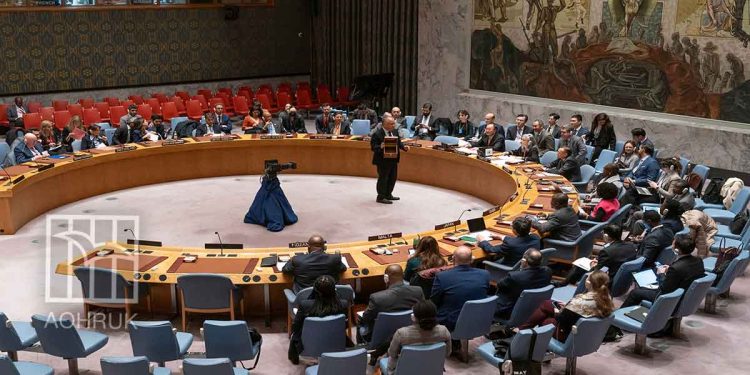Arab Organisation for Human Rights in the UK (AOHR UK) has, in a letter addressed to the judges of the International Court of Justice (ICJ), called for the removal of Ugandan Judge Julia Sebutinde, Vice-President of the Court, on the basis of Articles 2 and 18 of the Court’s Statute, after she openly revealed her ideological bias in favour of Israel amid the ongoing genocide being committed against the Palestinian people in Gaza and across the occupied Palestinian territories.
AOHR UK stressed that the core principles a judge of the ICJ must uphold, as explicitly set out in Article 2 of the Statute, are integrity, impartiality, and independence. Should any of these conditions be lost, Article 18 provides that the judge concerned must be removed with the consent of the other Members of the Court.
AOHR UK added that Judge Sebutinde has not only abandoned impartiality and integrity but has also expressed messianic religious ideas that encourage the continuation of the crime of genocide, which has already claimed tens of thousands of victims, the majority of whom are women, children, and the elderly.
AOHR UK explained that on 10 August 2025, during a speech delivered in a church in Uganda, Judge Sebutinde openly declared her religious support for the actions of the occupying power, stating:
AOHR UK emphasised that such statements were not surprising ; When the Court ordered provisional measures in the Gaza genocide case, and later issued its Advisory Opinion on 19 July 2024 regarding the nature of the Israeli occupation, Judge Sebutinde was the only judge to oppose all measures, including the facilitation of humanitarian aid. Her lengthy dissenting opinion to the advisory opinion clearly revealed her religious convictions and her absolute support for the occupation, denying—through a biblical lens—the existence of Palestine and the Palestinian people.
Her dissenting opinion, AOHR UK noted, relied heavily on biblical narratives and stories granting Israel fictitious rights, thereby conferring false legitimacy on the horrific crimes committed against Palestinian civilians. Such reasoning not only contradicts the foundations of international law but also emboldens the continuation of genocide, undermining the very principles upon which the Court’s authority rests.
AOHR UK further highlighted research by Professor Norman Finkelstein, revealed in February 2025 and due to be published in his forthcoming book Gaza’s Gravediggers (November 2025). His analysis demonstrated that approximately 32.2% of Judge Sebutinde’s dissenting opinion was plagiarised, with passages copied from Wikipedia, the BBC, and other sources without proper citation—a blatant violation of scholarly integrity, particularly egregious when committed by a judge of the world’s highest court.
The International Court of Justice, as the world’s highest judicial authority, is entrusted with cases of utmost sensitivity and carries a reputation grounded in resolving disputes strictly on legal principles, free from political pressure or religious considerations. Ignoring Judge Sebutinde’s conduct and statements would compromise the Court’s work and destroy its reputation.
While the Court’s rulings and advisory opinions on the rights of the Palestinian people—like many other UN resolutions—have too often gone unenforced, they nonetheless remain symbolically and legally significant in shaping international law. This makes the preservation and protection of the Court’s integrity a duty of paramount importance.
AOHR UK underlined that Judge Sebutinde’s revealed beliefs mirror the rhetoric of Israeli leaders such as Netanyahu, Ben Gvir, and Smotrich, who for over 22 months of killing, destruction, starvation, and displacement have invoked biblical and Talmudic narratives to justify crimes and spur on the military in pursuit of the “Greater Israel” project, as Netanyahu recently articulated.
AOHR UK urged states, scholars, thinkers, lawyers, and legal practitioners worldwide to press the judges of the ICJ to remove Judge Sebutinde, in order to safeguard the integrity, impartiality, and independence of the Court—particularly in light of overwhelming evidence that Israel considers itself a state above the law, emboldened by the colonial support of the West led by the United States.



























